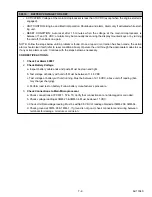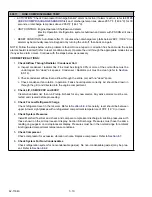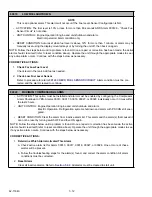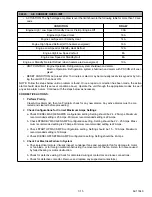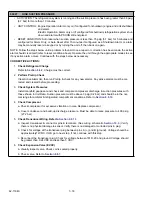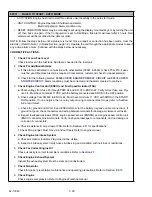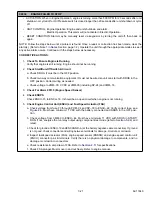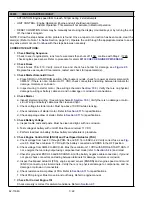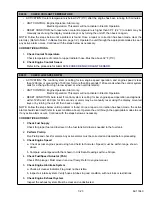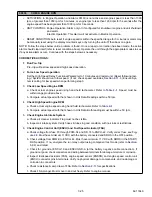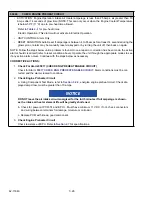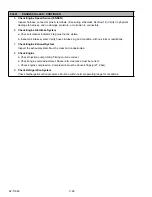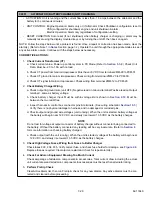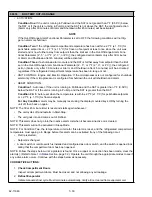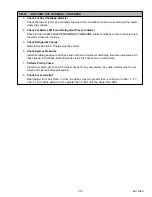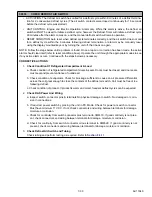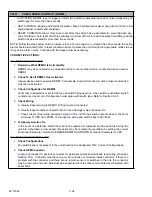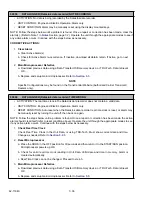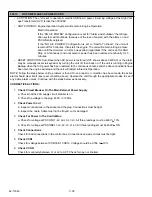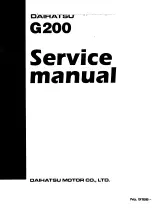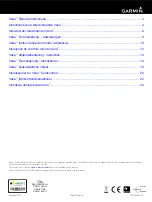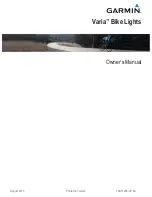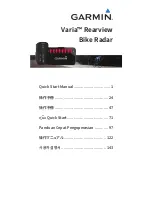
7–23
62-11640
00036
CHECK COOLANT TEMPERATURE
• ACTIVATION: Coolant temperature is below 32°F (0°C) after the engine has been running for 5 minutes.
• UNIT CONTROL: Engine Operation: Alarm only.
Electric Operation: This alarm will not activate in Electric Operation.
• RESET CONDITION: Auto reset when coolant temperature is higher than 36°F (2.2°C) or alarm may be
manually reset using the display mounted keys or by turning the unit off, then back on again.
NOTE: Follow the steps below until a problem is found. Once a repair or correction has been made, clear the
alarm(s). (Refer to Note 1 in
Section, page 7-2.) Operate the unit through the appropriate modes to see if
any active alarm occurs. Continue with the steps below as necessary.
CORRECTIVE ACTIONS:
1.
Check Coolant Temperature
Check temperature of coolant or upper radiator hose. Must be above 32°F (0°C).
2. Check Engine Coolant Sensor
Refer to the procedure for Alarm
00129 CHECK ENG COOLANT SENSOR
00037
CHECK LOW SPEED RPM
• ACTIVATION: The control system is calling for low engine speed operation, and engine speed is less
than 1200 rpm or greater than 1500 rpm for more than 60 seconds (120 seconds when the control system
calls for a change from high to low speed, or when unit first starts).
• UNIT CONTROL: Engine Operation: Alarm only.
Electric Operation: This alarm will not activate in Electric Operation.
• RESET CONDITION: Auto reset if control system is calling for low engine speed operation and signal is:
within 1220 and 1480 rpm for 60 seconds or alarm may be manually reset using the display mounted
keys or by turning the unit off, then back on again.
NOTE: Follow the steps below until a problem is found. Once a repair or correction has been made, the active
alarm should clear itself (refer to reset condition above). Operate the unit through the appropriate modes to see
if any active alarm occurs. Continue with the steps below as necessary.
CORRECTIVE ACTIONS:
1.
Check Fuel Supply
Check for proper fuel and fuel level in the fuel tank. Add fuel as needed to the fuel tank.
2.
Perform Pretrip
Run Pretrip and check for alarms. Any active alarms must be corrected and cleared before proceeding.
3.
Check Engine Speed
a. Check actual engine speed using hand held tachometer. Speed must be within range shown
above.
b. Compare actual speed with that shown in Unit Data. Readings within ± 50 rpm.
4.
Check Fuel/Speed Actuator (FSA)
Check FSA plunger. Must move in and out freely. Refer to engine manual.
5.
Check Engine Air-Intake System
a. Check air cleaner indicator. Flag must not be visible.
b. Inspect air intake system. Verify hoses & tubes in good condition, with no kinks or restrictions.
6.
Check Engine Exhaust System
Inspect the exhaust system. Must be clear and unobstructed.
Summary of Contents for Vector 8500
Page 23: ...62 11640 1 6 1 3 SAFETY DECALS ...
Page 24: ...1 7 62 11640 62 03958 ...
Page 25: ...62 11640 1 8 ...
Page 26: ...1 9 62 11640 ...
Page 27: ...62 11640 1 10 ...
Page 125: ...62 11640 SECTION 6 MESSAGECENTER PARAGRAPH NUMBER Page 6 1 MESSAGECENTER MESSAGES 6 1 ...
Page 321: ......
Page 322: ......

